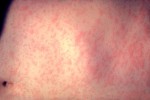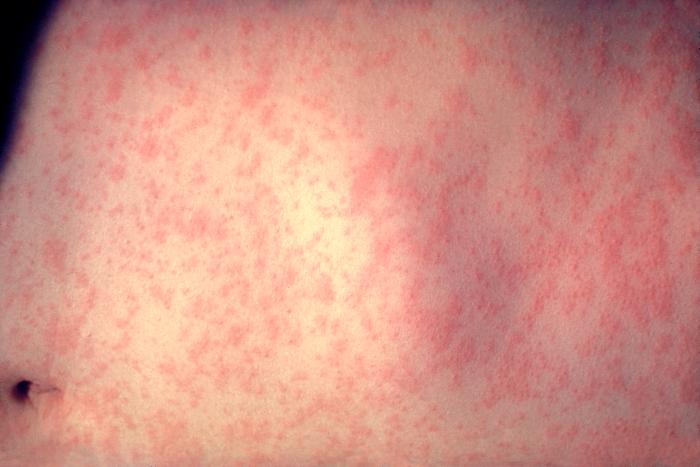
What is measles?
Measles is a very serious and contagious disease caused by a virus. Because so many people are vaccinated, measles is no longer common in the United States. But it is still common in many other countries and may be brought into the U.S. by unvaccinated travelers, which is what happen in Minneapolis in the spring of 2011. Making sure everyone is vaccinated helps prevent measles outbreaks.
What are the symptoms of measles?
• Fever AND
• Rash AND
• Cough OR runny nose OR watery/mattering eyes
Symptoms appear about one to two weeks after a person is exposed to measles. The first symptom is usually fever. The rash usually appears two to three days after the fever begins and lasts five to six days. The rash begins at the hairline, and moves down the body.
How serious is measles?
Many people with measles have complications like diarrhea, ear infections, and pneumonia. Sometimes measles causes a brain infection that can lead to permanent brain damage. Complications are more common in children under 5 years of age and adults older than 20. It can be especially severe in persons whose immune systems are weak. Measles during pregnancy might cause a miscarriage or early labor which causes low birth weight babies. Measles can lead to hospitalization and even death.
How does measles spread?
Measles is spread through the air when people who have it breathe and cough. It is highly contagious.
Fortunately, once you have had measles you cannot get it again.
How long is a person with measles contagious?
A person with measles can pass it to others from four days before and four days after their rash appears.
Is there a treatment for measles?
No, there is no specific treatment for measles. People with measles need bed rest, fluids, and control of fever. They may also need treatment for complications such as diarrhea, ear infection, or pneumonia.
If you or your child has symptoms of measles, what should you do?
Be sure to stay at home and avoid having visitors until you have talked with your doctor or clinic. Your doctor or clinic will tell you if you should come in for a visit.
Is there a vaccine for measles?
Yes. The measles vaccination is combined with mumps and rubella called MMR.
Children should receive two doses of MMR vaccine: the first at 12 to 15 months of age and the second at 4 to 6 years of age. (During a measles outbreak, children may receive the second dose as soon as four weeks after the first dose, even if they haven’t turned 4 years old.)
All adults who have not had measles or a measles shot should receive MMR vaccine, particularly if they were born in 1957 or later.
Certain adults (such as health care workers and travelers) should receive up to two doses of MMR vaccine to make sure they are protected.
Children as young as 6 months old who are traveling overseas should also get an MMR. Talk to your healthcare provider before you travel.
If you or your child has been exposed to measles, what should you do?
Call your doctor or clinic right away. They will let you know if you need to come in for a visit.
If you have not been vaccinated, getting an MMR shot within three days of being exposed may prevent them from getting measles.








